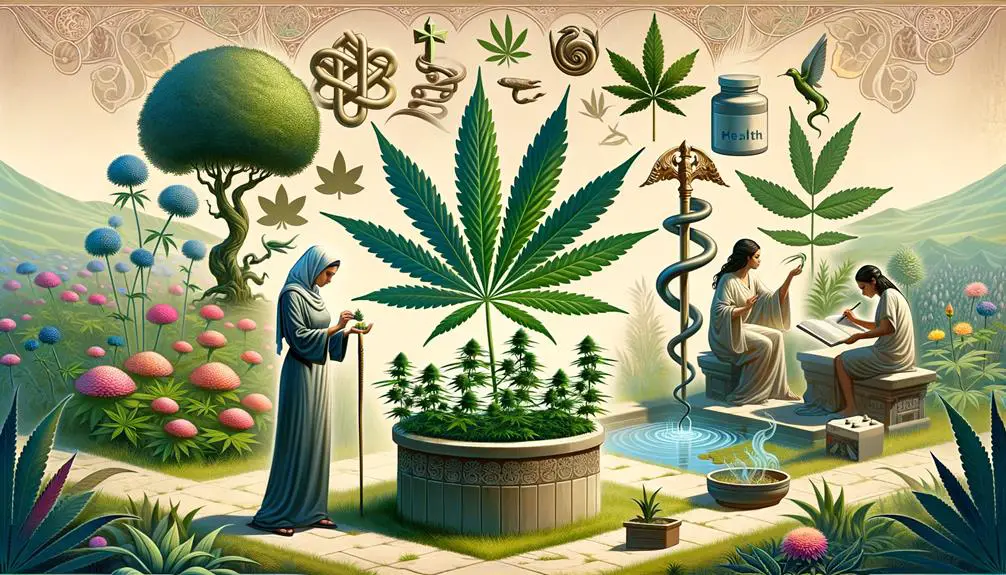Gain insights into biblical perspectives on smoking weed and explore the moral implications of mind-altering substances.

Where in the Bible Does It Talk About Smoking Weed
Did you know that over 22% of adults in some countries report using cannabis for recreational purposes? This statistic raises intriguing questions about its moral and ethical implications, especially from a biblical standpoint.
You might wonder where, if at all, the Bible discusses smoking weed or the use of cannabis. While the scripture doesn't directly mention marijuana, interpretations of certain passages could offer insights into how it views substances altering one's state of mind.
Exploring these interpretations not only enlightens your understanding of biblical principles but also invites you to reflect on the broader implications of sobriety, stewardship, and moral living.
Key Takeaways
- The Bible does not explicitly mention cannabis or smoking weed.
- Biblical teachings emphasize moderation, wisdom, and self-control, which can apply to substance use.
- Scriptures advocate for sobriety and stewardship of the body, suggesting care in substance choices.
- Interpretations on cannabis in the Bible rely on broader themes of health, well-being, and personal accountability.
Historical Context of Cannabis

Tracing back through centuries, cannabis has played a significant role in various cultures for medicinal, spiritual, and recreational purposes. Its ancient uses and cultural significance are deeply intertwined with human history, painting a complex picture of humanity's relationship with this plant. You'll find that, across civilizations, cannabis wasn't merely a substance to be consumed; it symbolized profound societal and religious elements.
In ancient China, for instance, cannabis was regarded as a staple in medicinal practices, used to treat a variety of ailments. This reflects a broader understanding of its therapeutic properties, a knowledge that transcended borders and epochs. Similarly, in ancient India, cannabis held a sacred place in religious ceremonies, illustrating its spiritual significance. These instances highlight how deeply cannabis was revered, its uses reflecting the societal values and beliefs of the time.
Moreover, the cultural significance of cannabis can be observed in ancient texts and rituals, providing insights into its role in societal development. It wasn't just a plant; it was a medium through which cultures expressed their identity, beliefs, and practices. This deep-rooted historical context underscores the versatility and enduring presence of cannabis in human culture.
Analyzing the ancient uses and cultural significance of cannabis offers a scholarly lens through which you can understand its complex history. It's clear that its role extends far beyond mere recreational use, encompassing medicinal, spiritual, and societal dimensions. This exploration into its historical context reveals the multifaceted relationship between humanity and cannabis, a bond forged through centuries of shared history.
Biblical Passages Interpreted
Having explored the historical significance of cannabis across cultures, we now examine how biblical passages have been interpreted concerning its use. Ancient interpretations of scripture don't directly mention cannabis, leading to divergent views on its cultural relevance and permissibility according to biblical standards. Scholars and theologians have sifted through texts, seeking any reference or implication that could connect the plant to spiritual or medicinal use in biblical times.
One debated passage is Genesis 1:29, where God gives 'every seed-bearing plant on the face of the whole earth' to humanity. Some argue this includes cannabis, highlighting its ancient use and potential benefits. However, this interpretation depends heavily on historical context and the broader biblical narrative concerning intoxication and stewardship of the body.
Further analysis reveals that the Bible emphasizes moderation, wisdom, and discernment in all things, which could extend to the use of substances like cannabis. Proverbs, for instance, advises against behaviors that impair judgment or lead to folly, a principle some apply to the discussion of recreational drug use.
The cultural relevance of cannabis in ancient times, compared to its mention or absence in biblical texts, offers a complex landscape for interpretation. Without explicit references, scholars rely on historical context, linguistic analysis, and the overarching themes of scripture to guide understanding. This approach underscores the importance of considering both the letter and the spirit of biblical teachings when addressing contemporary issues like cannabis use.
Principles of Sobriety

You'll find that the Bible's teachings offer clear guidance on sobriety, emphasizing commandments on sobriety, the virtue of wisdom coupled with self-control, and the admonition to steer clear of intoxicating substances.
These principles serve as a moral compass, directing believers towards a life of moderation and discernment.
Analyzing these biblical tenets, it's evident that the scripture advocates for a sober lifestyle, underscored by a commitment to spiritual and physical well-being.
Biblical Sobriety Commandments
The Bible strongly emphasizes the importance of sobriety, presenting it not merely as a recommendation but as a commandment rooted in the spiritual well-being of believers. Through temperance teachings, it advocates for a lifestyle that honors spiritual discipline, urging followers to abstain from practices that could impair judgment or detract from their faithfulness.
This call to sobriety is interwoven with the broader biblical narrative that values self-restraint and moderation as key aspects of a devout life. Such commandments aren't arbitrary rules but are designed to foster a deeper, more meaningful connection with the divine. They underscore the belief that maintaining sobriety is essential in living out one's faith fully and serving as a testament to the transformative power of spiritual discipline.
Wisdom and Self-Control
Within biblical teachings, wisdom and self-control emerge as foundational principles of sobriety, advocating for a life led with discernment and restraint. You're encouraged to exercise wisdom in decision making, navigating life choices with a clear, unclouded judgment.
The scriptures don't explicitly address modern issues like smoking weed, but the underlying message promotes a lifestyle that values self-control as a virtue. This concept is crucial in understanding how you're to approach various temptations and influences.
Avoiding Intoxicating Substances
Many biblical teachings implicitly advocate for avoiding intoxicating substances, emphasizing principles of sobriety as integral to leading a spiritually fulfilling life. This guidance, while not explicitly mentioning modern substances, lays a foundation that resonates with contemporary discussions about substance use.
Biblical Principle |
Modern Implications |
|---|---|
Sobriety |
Avoiding drug abuse |
Self-control |
Managing impulses |
Wisdom |
Making healthy choices |
Stewardship |
Caring for one's body |
Community |
Supporting others' sobriety |
These principles challenge you to critically assess societal norms surrounding substance use. Engaging with these teachings invites a deeper exploration of how personal choices align with spiritual values, encouraging a lifestyle that prioritizes health, wisdom, and communal well-being, thus navigating the complex terrain of modern societal challenges with a biblically informed perspective.
Stewardship and the Body

Considering biblical teachings, it's essential to recognize that stewardship of the body implicates a responsibility towards maintaining one's health and well-being. The concept of the body as a temple, coupled with the principle of personal accountability, underscores a profound duty to care for oneself in a manner that honors God. This perspective forms the cornerstone of a biblical view on substances that could potentially harm the body, including the consumption of marijuana.
To further elucidate this point, consider the following aspects:
- Body as a Temple: The scripture teaches that the body is a temple of the Holy Spirit (1 Corinthians 6:19-20), implying a sacred duty to maintain its sanctity. Introducing substances that could impair its function disrespects this divine stewardship.
- Personal Accountability: Each individual will have to give an account of their actions to God (Romans 14:12). This includes decisions about how one treats their body, making personal health and well-being a matter of spiritual importance.
- Prudence in Habits: Proverbs 25:28 compares a person without self-control to a city broken into and left without walls. Applying this wisdom, exercising restraint and avoiding habits that could harm the body align with prudent stewardship.
- Seeking Wholeness: The pursuit of wholeness—body, mind, and spirit—is a biblical principle. Engaging in activities that could jeopardize physical health contradicts this pursuit, urging caution and discernment in lifestyle choices.
Moral Living Guidance
You must consider how Biblical teachings on substance use provide a framework for moral living and spiritual health. The scriptures offer insights that guide you in making informed decisions regarding your physical and spiritual well-being.
It's essential to analyze these teachings to understand their implications on modern practices like smoking weed.
Biblical Substance Use
The Bible, while not explicitly mentioning modern substances, offers guiding principles on substance use that emphasize moderation and self-control. Ancient texts reveal that substances, including ancient remedies and ceremonial uses, were part of life, yet the overarching message was one of restraint and purposeful living.
Here are key points to consider:
- Ancient Remedies: The use of natural substances for healing, acknowledged without promoting excess.
- Ceremonial Uses: Substance use in religious ceremonies, emphasizing spiritual significance over indulgence.
- Moderation: A recurring theme, advocating for balance in all aspects of life.
- Self-Control: The value of governing one's desires and actions, a cornerstone of moral living.
Analyzing these aspects, it's clear that the Bible's guidance on substance use is nuanced, advocating for a mindful approach that respects the body and spirit.
Spiritual Health Practices
Biblical teachings advocate for spiritual health practices as essential components of moral living, emphasizing their significance in fostering a balanced and purposeful lifestyle. You'll find that disciplines such as meditative prayer and spiritual fasting serve not just as rituals, but as pathways to deepen your relationship with the divine and enhance personal growth.
Practice |
Purpose |
|---|---|
Meditative Prayer |
Facilitates a deeper connection with God, promoting peace and clarity. |
Spiritual Fasting |
Aids in self-discipline, purification, and reflection on spiritual matters. |
These practices are embedded within the fabric of moral living, guiding you towards a life of moderation, introspection, and spiritual awareness. They aren't merely acts of devotion; they're tools for cultivating a mindful, ethically aligned existence.
Wisdom on Substance Use

Exploring ancient texts, one discovers nuanced insights into substance use, suggesting a complex interplay between spirituality, morality, and human behavior. These texts often don't address modern addictions directly but provide a framework for ethical consumption and self-control that's remarkably relevant today. By examining these ancient wisdoms, you can gain perspective on managing substance use in a way that honors your body and spirit.
To better understand this wisdom, consider these key points:
- Moderation is Key: Most ancient texts advocate for moderation in all things. Excessive use of any substance can lead to physical and spiritual harm, suggesting that balance is essential for health and well-being.
- Intention Matters: The intent behind substance use is critically examined. Using substances to escape reality rather than for medicinal or moderate social use is often discouraged, highlighting the importance of mindfulness in consumption.
- Community Impact: Consideration of how substance use affects not just the individual but the wider community is a recurring theme. Ethical consumption involves recognizing and mitigating any negative impacts on one's community.
- Self-Control and Wisdom: A strong emphasis is placed on self-control and wisdom, suggesting that individuals should seek to understand their motivations and the potential consequences of their actions regarding substance use.
These ancient principles offer a valuable lens through which to view modern challenges related to substance use. They encourage a holistic approach that considers not only the physical effects but also the moral, spiritual, and communal implications of our choices.
Christian Perspectives Explored
Drawing from the wisdom on substance use in ancient texts, let's now examine how Christian teachings provide insights into the ethical considerations surrounding substance consumption. Christian perspectives on this matter are diverse, reflecting broader discussions on morality, health, and spirituality. The Bible doesn't explicitly mention marijuana or smoking weed, but it does address the use of substances in a way that can inform contemporary debates.
Christian teachings emphasize moderation, self-control, and respect for the body as a temple of the Holy Spirit (1 Corinthians 6:19-20). From this viewpoint, anything that impairs one's ability to think clearly or control one's actions could be viewed skeptically. However, it's also important to note that the Bible encourages compassion and understanding, suggesting a nuanced approach to those struggling with substance dependency.
The legal implications and cultural acceptance of marijuana vary significantly across different societies and have evolved over time. In regions where it's legal, Christians are prompted to consider the law of the land in light of biblical principles of obedience to governing authorities (Romans 13:1). Yet, legality doesn't equate to moral permissibility, urging a thoughtful examination of personal and communal ethics.
Cultural acceptance also plays a crucial role in shaping Christian perspectives. In societies where medical use of marijuana is recognized and recreational use is socially accepted, Christians are challenged to discern their stance, balancing cultural trends with biblical teachings on sobriety, stewardship of the body, and the pursuit of spiritual wholesomeness.
Frequently Asked Questions
How Do Modern Legalizations of Cannabis Affect the Christian Stance on Smoking Weed?
Modern legalizations of cannabis have stirred significant moral debates within Christian communities, challenging traditional views. You're now faced with navigating the legal implications while reflecting on your faith's teachings.
This shift doesn't just alter legal standings but also invites you to critically assess the moral aspects of smoking weed. It's a complex interplay between adhering to the law and aligning with personal and communal religious convictions, prompting a thoughtful reevaluation of stance.
Are There Any Recorded Instances of Early Christians or Notable Religious Figures Using Cannabis or Similar Substances?
Diving into history's foggy depths, you'll find no clear evidence of early Christians or notable religious figures lighting up cannabis as part of their spiritual practices.
Yet, when considering ancient rituals within their cultural context, one might argue that various substances were used to reach heightened states of consciousness or for medicinal purposes.
However, specifically linking these practices to cannabis use remains speculative at best, lacking concrete proof or direct references in historical records.
How Do Different Denominations Within Christianity Vary in Their Views on the Use of Cannabis?
You'll find that Christian denominations vary in their views on cannabis use, largely due to differences in scriptural interpretation and moral guidance.
Some groups might see it as permissible under certain conditions, seeking support from broader biblical principles rather than specific texts.
Others adhere strictly to a moral code that forbids any substance use, including cannabis.
This divergence underscores the complexity of applying ancient scriptures to contemporary issues like cannabis consumption.
Can the Use of Medical Marijuana Be Justified Within a Christian Framework, Particularly When Other Treatments Have Failed?
In the labyrinth of ethical dilemmas, you're faced with the question of medical marijuana's place within a Christian framework, especially when conventional treatments have failed. This issue dives deep into scriptural interpretations, balancing the scales between adherence to faith and the pursuit of relief.
Analytically speaking, the Bible doesn't directly address cannabis, leaving Christians to navigate this gray area by analyzing broader scriptural principles on health, healing, and the stewardship of one's body.
How Do Christian Counselors Approach the Topic of Addiction to Cannabis and Its Impact on Spiritual Well-Being?
As you explore how Christian counselors address cannabis addiction, you'll find they often blend counseling techniques with spiritual exercises to enhance spiritual well-being.
They'll analyze your situation, focusing on both psychological and spiritual dimensions, to tailor a recovery plan.
This approach ensures you're not just overcoming addiction, but also nurturing your faith.
They believe in treating the whole person, recognizing that spiritual health is crucial for overall recovery.
Conclusion
In sum, the Bible doesn't explicitly mention smoking weed, but its teachings on sobriety, stewardship of the body, and moral living offer a clear compass. Analyzing these passages, it's evident that the essence of biblical wisdom cautions against substance misuse.
As you sift through Christian perspectives, remember that moderation is the key, and too much of anything can lead to a slippery slope. In essence, the Bible encourages a life of balance, wisdom, and thoughtful stewardship of one's body and mind.



Sign up